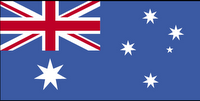
He confirmed what the blog's Australia authority "Dutch" wrote about the benefits of "cultural cringe" for Australia and how some of that "residual insecurity" might be good for aspects of American culture:
I completely agree that American literature in a sense 'needs' the insecurity of the cultural cringe, that it is enabling in some ways--giving an awareness of marginality, dependence, vulnerability against which our cultural behemoth tends to harden itself. Of course 'trying harder' for excellence is a bit different in literature than in wine or athletics, but that point is generally very well taken and, indeed, has always been something that has drawn me to Australia--that enabling sense of marginality.On the particular question of Peter Carey's work, he added:

The opening paragraphs of The Unusual Life of Tristan Smith clearly demonstrate Birns's point: read them here.Of Carey's works, the novel that deals with this issue most explicitly is The Unusual Life of Tristan Smith.
The phrase, though, should, of rights, be 'cultural cringe', not 'culture cringe'; it was coined by A. A. Phillips in the 1950s. At first, it largely referred to England--but as time went on, the US became the major cultural reference point for Australians, though England has certainly not entirely faded as such. (Look at the prestige Carey has garnered for winning the Booker Prize).
A few years ago Carey was interviewed by Powells.com: read that interview here.
Nicholas Birns is a professor in the literature program at Eugene Lang College at the New School University. He is the author of Understanding Anthony Powell, which New York magazine called "a perfect guide to Powell's twelve-volume novel A Dance to the Music of Time," and co-editor of the forthcoming Companion to Twentieth Century Australian Literature. He is also author of many scholarly articles, book chapters, and books reviews.
Thanks to Nicholas for the input.
--Marshal Zeringue





